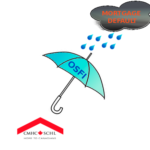Mortgage Tightening Rules “For Dummies”


Today, maximum insurable Mortgages are 25 years, I can only refinance my Mortgage up to 80% of the homes value, with income and down payment documents looked at with squinty eyes through a magnifying glass.
These are the facts and I’m not complaining!
We are in an era of continued Mortgage rules that are tightening like a constrictor snake.
Here’s why …
Office of the Superintendent of Financial Institutions (OSFI) (Sounds like: Oss-fee)
First, let’s be clear WHAT OSFI is:
“The Office of the Superintendent of Financial Institutions (OSFI) is an independent agency of the Government of Canada reporting to the Minister of Finance created “to contribute to public confidence in the Canadian financial system”.”
In other words, they’re the watch-dog protecting Canadian tax payers from unscrupulous Banking decisions. And OSFI’s mandate trickles into Mortgage lending regulations and prudent underwriting policies.
In plain language, OSFI is clamping down on Federally Regulated Financial Institutions (Banks) to increase their scrutiny of Mortgage borrowers. OSFI also has a hand in actual Mortgage lending criteria changes too.
For example, one of the most recent OSFI rule changes was the change in minimum down payment on homes more than $500K. You might remember, the minimum down payment for a home under $500K is 5%. On any home more than $500K, the minimum down payment, on the amount over $500K is 10%.
If your purchase price is $700K, the minimum down payment on the first $500K is 5% and 10% of the remaining $200K. The intention is to help mitigate risk of higher purchase price amounts in an attempt to slow hot housing markets in certain parts of Canada (Toronto & Vancouver).
What’s Happening With OSFI Now??
The Office of the Superintendent of Financial Institutions (OSFI) has a Capital Adequacy Requirement (CAR) guideline that provides a framework for Financial Institutions (FI’s) to abide by. This guideline is reviewed and updated to reflect any risk in the particularly lending arena.
One of the BIG objectives of the Capital Adequacy Requirement (CAR) is to ensure Financial Institutions (FI’s) hold adequate capital against equity investment funds.
Meaning, if “things get real” (RE: values decrease and Mortgage default increase) in the Canadian housing market, the Banks themselves have assets to fall back on. Tax payers do not want the sole burden of carrying the financial debt of a failing housing sector (should it happen).
The term “risk sensitive floors” is used to help Banks decide the loans they are willing to take on to abide by CAR. The risk sensitive floor is a model used to anticipate loss given the behaviour of property prices (over the last three years) and household income relative to these prices. The future value certainty of homes used as collateral is also a factor in the “risk sensitive floor” decision.
Mortgage Insurance companies (CMHC, Genworth Financial and Canada Guaranty) now require more capital when house prices are high, relative to borrower income. We saw this change come into effect with the increase of a 5% down payment Insurance premium increased to 3.60% from 3.15%.
OSFI is also mandating tighter and more prudent Mortgage underwriting guidelines to ensure borrowers utmost quality.
Knowing this, here’s what is happening …
Other Mortgage Rule Tightening Explained:
Mortgage lenders and insurance companies (CMHC, Genworth Financial & Canada Guaranty) are increasing their due diligence when reviewing traditional and non-traditional income verification.
People, please maintain solid records of your employment history, keeps your taxes paid up to date, and tax plan ahead if you anticipate any Mortgage need in a two year time horizon.
Increased scrutiny of rental income and any variable income used to qualify for a Mortgage is already a reality. Many Mortgage lenders are only willing to use 25% more income, relative to any overtime or bonus income earned by the borrower, for Mortgage qualifying.
Literally, What This Means For You?
Remember, OSFI is operating on a National level. Other parts of our Nation are experiencing sky rocketing property values that dwarf the run Calgary had in 2004-2007.
With this context, and understanding the shaky financial footing our Country is on as a whole, changes are looming and in most cases already applied.
Unfortunately for Calgary, our Real Estate sector isn’t relatively strong right now and we are STILL subject to OSFI National policy change.
With so many variables that Mortgage lenders (Banks) are facing, I think the value of a Mortgage Broker, to intelligently shop the market, with access to multiple lenders and Mortgage Insurance companies, increases for you.
I also think planning, years a head of time, for your next Mortgage need is incredibly important. Please email me so I can add you to my private list of informed Calgaryians who want simple, important and update Mortgage/Real Estate information.
Thank you!
Chad Moore
Recent Posts
Calgary Market Update—March 2025 Data
Here are some Calgary Real Estate numbers, across all property types, out of the gate for…
Interest Rates Up Or Down?
Hey Guys! Tariffs are here. Now what? Tiff Macklem, governor of the Bank of Canada, gave…
Bank of Canada Hot Mic Moment
Hey Guys! The Bank of Canada publishes "meeting deliberation notes" relating to the discussion of raising,…
Banker’s Damaging Admission
When the governor of the Bank of Canada speaks, we listen! Tiff Macklem, governor at…
January 2025 Market Stats
Let's look back at January 2025 Calgary Real Estate Board (CREB) data to make sense…
Mortgage Interest Rate Review
Hey Guys! Here's an example of how the Bank of Canada is in a balance…



View Comments
This is great information Chad - thank you for making this clearer for us REALTORS and especially for our clients!
Thanks Krysaly!
Always happy to help (and thanks for reading :-))
- Chad